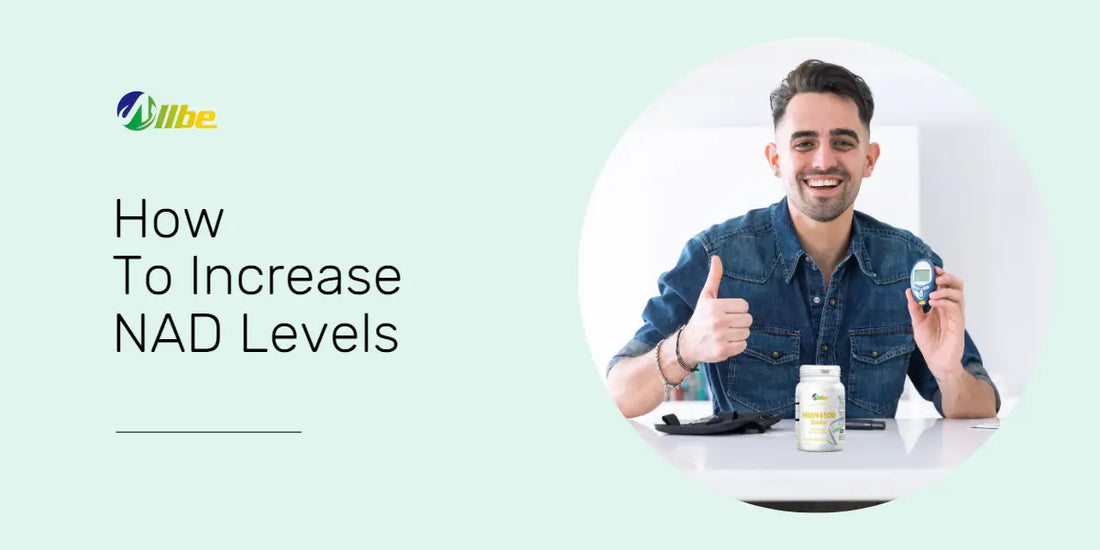
How To Increase NAD Levels
As we age, our bodies experience a decline in NAD+ levels, a vital coenzyme involved in various cellular processes, including DNA repair, energy metabolism, and cell signaling. This decrease can lead to many age-related health problems, such as cognitive decline, neurodegeneration, and cardiovascular disease. Fortunately, there are ways to increase NAD+ levels naturally and keep our bodies feeling and looking younger.
In this article, I will discuss tips for increasing NAD+ levels and provide insights into how you can enhance your overall health and well-being. Let's dive in!
What is NAD+?
Nicotinamide adenine dinucleotide (NAD+) is a coenzyme that regulates a wide array of cellular processes, including:
- Enhanced Metabolism
- DNA repair
- Cell Signaling
- ATP production
By maintaining DNA integrity and high energy levels, NAD+ has been shown to help counter aging signs at the cellular level. Our body naturally produces it through multiple pathways. Younger people have higher levels of NAD+, but their levels start decreasing with age.
Why Do NAD+ Levels Decline?
As we age, NAD+ levels in our body start declining naturally. Many internal and external factors can also affect the rate at which this reduction occurs. Among these, DNA damage is the primary reason for decreased levels of NAD+. Excessive accumulation of free radicals and reactive oxygen species (ROS) inside the body causes cellular damage.
Additionally, poor diet and unhealthy lifestyles can also impact NAD+ levels. The body produces NAD+ through a variety of pathways. One such path, named Preiss-Handler pathway, synthesizes NAD from Niacin, an essential vitamin. Fish, red meat, nuts, seed, legumes, and bananas are rich in this vitamin. A diet lacking niacin can lead to a decrease in NAD+ levels.
Another factor that contributes to the decline in NAD+ levels is mitochondrial dysfunction. Mitochondria are organelles within cells responsible for producing ATP, the primary energy source for the cell. NAD+ is a critical coenzyme involved in the production of ATP, and mitochondrial dysfunction can lead to a decrease in NAD+ levels.
Finally, some medications can also contribute to a decline in NAD+ levels. For example, some cholesterol-lowering drugs called statins can decrease NAD+ levels by inhibiting mevalonate synthesis, a precursor to NAD+.
Understanding the various factors contributing to the decline in NAD+ levels is essential in developing effective strategies for increasing NAD+ levels naturally. By addressing these factors and making positive lifestyle changes, it is possible to maintain healthy NAD+ levels and enjoy the benefits of improved cellular health and longevity.
Tips to Increase Your NAD+ Levels
Here are some practical tips that can improve NAD level inside your body:

Eat a Balanced Diet rich in Niacin
Include foods in your diet that are rich in niacin. As mentioned above, this essential vitamin acts as a NAD+ precursor. So, by increasing the intake of niacin-rich foods, you can thereby boost NAD production. Make sure not to take the vitamin in excess, as it can affect your body adversely.
Engage In Regular Exercise
Exercise has countless health benefits. But do you know regular exercise can also boost the NAD levels in the body? Studies have shown that frequent physical activity can increase NAD+ levels inside the body. The mitochondrial activity in muscle cells increases with physical training and exercise.
Practice intermittent fasting
Calorie restriction has been shown to promote longevity in many species. For that reason, intermittent fasting has gained popularity in recent years. The approach is characterized by alternating periods of fasting and eating.
Fasting promotes NAD+ levels by increasing the expression of genes involved in its biosynthesis. During periods of dietary restriction, the body goes into ketosis, which increases NAD+ levels to promote metabolic activity.
Get enough sleep
The importance of sleep to health can't be overstated. Both cellular and physical functioning rely on the quality of sleep. Recent studies have shown that sleep can increase NAD+ levels in the body.
Reduce Exposure to Environmental Stressors
NAD+ levels may decline when our bodies are continuously exposed to pollutants, UV rays, toxins, and other environmental stressors. Taking proper precautions against these hazards can reduce the risk of a decrease in NAD+ levels.
Consider Taking NMN or NR Supplements
Both NMN and NR are precursors to NAD+, which can increase levels in the body. Because of this, many NAD booster supplements have either NMN or NR as the main ingredient. Supplements like NMN 4500 can help increase NAD+ levels naturally.
Reduce alcohol consumption
Drinking alcohol can lower NAD+ levels. By limiting alcohol intake or abstaining from it altogether, you can maintain healthy levels of NAD+.
Manage Stress
Stress can lead to a decline in NAD+ levels, so managing stress levels is important to keep them healthy. Practicing mindfulness, meditation, or yoga can help reduce stress and promote overall well-being.
Stay Hydrated
Dehydration can lead to a decline in NAD+ levels, so it's important to stay hydrated by drinking enough water throughout the day. Aim for at least eight glasses of water daily, and more if you engage in strenuous physical activity.
Avoid Smoking
It has been shown that smoking causes oxidative stress, which can lower NAD+ levels. Maintaining healthy NAD+ levels can be achieved by quitting smoking or avoiding passive smoking.
Get regular check-ups
Certain medical conditions, such as diabetes and liver disease, can lead to a decline in NAD+ levels. It's important to get regular check-ups with your healthcare provider to monitor your health and address any underlying conditions that may be affecting your NAD+ levels.
The Bottom Line
NAD is essential for many cellular functions. However, its levels start decreasing as we age. A balanced diet, exercise, and other lifestyle changes can help you boost NAD+ levels naturally. You can also use NMN supplements for this purpose.
